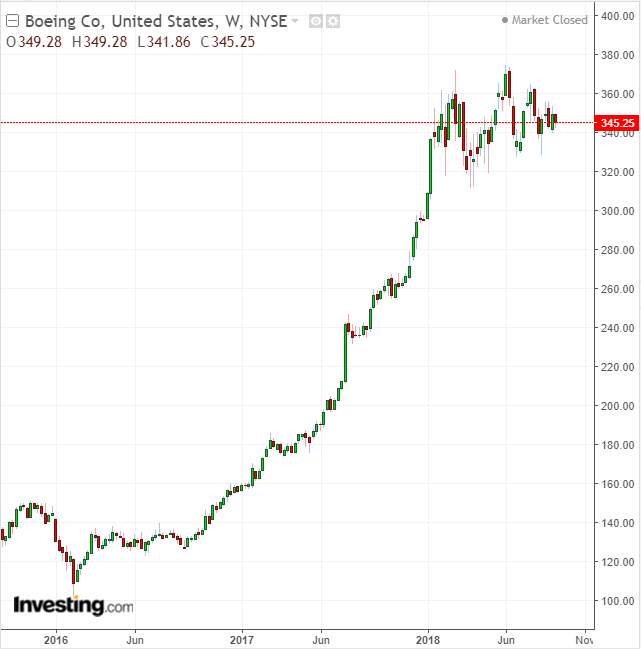
- All Instrument Types
- Indices
- Equities
- ETFs
- Funds
- Commodities
- Currencies
- Crypto
- Bonds
- Certificates
Please try another search

Here's Why Boeing Is Still An Excellent Long-Term Play

by Katie Spence
Over the past three years, Boeing (NYSE:BA) shares have soared more than 140%, thanks, in part, to lucrative commercial airplane orders and completed deliveries of these aircraft. But since hitting a high of almost $372 in June, shares of the Chicago-based aerospace and defense company have fallen about 10%.

Is this the beginning of a continuing downward trend for Boeing or just a slight dip on an otherwise bright horizon?
China is currently the second-largest aviation market in the world. Thanks to rapid growth, many analysts believe it could take the No. 1 spot over the next few years. Just this week, Boeing raised its forecast on China airplane purchases. Boeing now expects the Asian country to buy 7,690 planes worth about $1.2 trillion over the next 20 years, a little more than 6% higher than its previous estimate.
On the surface, this seems like great news for Boeing. When it comes to airplane orders, China tends to favor Boeing, but it splits its airplane orders between Boeing and European rival Airbus (PA:AIR).
But tensions between the US and China have escalated into what many are now calling a trade war. So far, Boeing has remained relatively unscathed. If this battle becomes more acrimonious, there's a very real possibility that China could place more orders with Airbus as a form of retaliation against the US. In 2017, orders from China accounted for almost $12 billion of Boeing’s total revenue.
The good news, however, is that while Airbus could take the lead over Boeing when it comes to Chinese airplane orders, it’s unlikely that China would stop placing orders with Boeing altogether. Airbus alone doesn’t have the capacity to keep up with China’s airplane demand.
This brings us to the second, and more concerning problem currently hampering Boeing’s stock: production problems.
737 Completion Woes
As of its second-quarter report, Boeing’s total backlog was more than $488 billion. But take a closer look. Note that of that $488 billion, more than $415 billion is commercial airplane sales. To put it simply, commercial airplane sales and deliveries have the biggest impact on Boeing’s bottom line and investors should keep tabs on anything that disrupts this. Which brings us to Boeing's 737.
The 737 is the most popular and lucrative plane Boeing makes. According to its Q2 report, for the six months ended June 2018, Boeing delivered 378 total commercial planes, and of those deliveries, 269 were for Boeing’s 737. These deliveries are important to pay attention to because Boeing doesn't get paid until the aircraft is "completed and accepted by the customer."
Unfortunately, Boeing is now experiencing significant problems when it comes to completion of its 737. As of this writing, there were 53 undelivered 737 jetliners outside of Boeing's assembly plant in Renton, Washington, according to the Seattle Times. Further, while Boeing has assured analysts that the pileup will be fixed by year-end, internal documents obtained by the Seattle Times show that employees are working constant overtime.
There's a general sense of burnout among staff and the parts that Boeing has had problems obtaining from its suppliers—and needs in order to complete its 737—could still present a problem going into 2019. A union official told Reuters Monday that Boeing is bringing retired workers back on the job to help with the production delays.
There's no doubt that Boeing is facing problems right now. But that's not enough to truly hurt Boeing in the long run. First, Boeing is one of the largest aircraft manufacturers in the world and the global commercial aircraft market is expected to be worth a significant amount in the near future. ASD Reports puts it at $255 billion a year by 2028.
Second, while Boeing's current production problems aren't great news, it's also not the first time the company has faced this problem and overcome it. In 1997, Boeing's production problems cost it billions in write-offs, but Boeing was able to recover and bounce back. We believe the same will likely happen now.
Bottom Line
Boeing's stock has declined slightly over the last few months, but it should recover and then continue to grow over the long run. Most analysts rate Boeing a buy and give it a price target north of $411 a share. While Boeing shares, which closed yesterday at $345.25 aren't cheap by any measure, its current dip could help make it a great long-term play for investors.
Related Articles

The cryptocurrency market experienced a major rally following Donald Trump’s announcement that Bitcoin, Ethereum, XRP, Solana, and Cardano will be included in a new U.S. strategic...

One of the easiest risks to minimize in investing is excessive fund fees. That’s why, when looking for ETFs, you should always try to minimize the management fee, which is the...
Are you sure you want to block %USER_NAME%?
By doing so, you and %USER_NAME% will not be able to see any of each other's Investing.com's posts.
%USER_NAME% was successfully added to your Block List
Since you’ve just unblocked this person, you must wait 48 hours before renewing the block.
I feel that this comment is:
Thank You!
Your report has been sent to our moderators for review





Add a Comment
We encourage you to use comments to engage with users, share your perspective and ask questions of authors and each other. However, in order to maintain the high level of discourse we’ve all come to value and expect, please keep the following criteria in mind:
Perpetrators of spam or abuse will be deleted from the site and prohibited from future registration at Investing.com’s discretion.